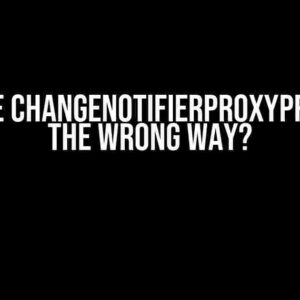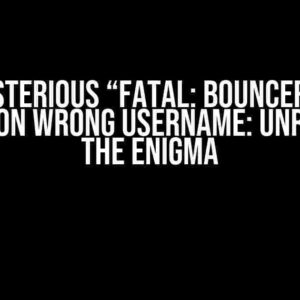Ah, the woes of working with progress_dialog! You’ve probably stumbled upon this article because you’re stuck with a pesky error message, and you’re wondering what on earth is going on. Fear not, dear developer, for you’re about to embark on a journey to conquer the “Because progress_dialog 1.2.4 doesn’t support null safety and no versions of progress_dialog match >1.2.4 <2.0.0, progress_dialog ^1.2.4 is forbidden" conundrum.
What’s the Problem, Anyway?
The error message might seem like a jumble of technical jargon, but don’t worry, we’ll break it down for you. Essentially, the issue arises when you’re trying to use progress_dialog version 1.2.4 in your project, but it doesn’t support null safety. Null safety is a feature introduced in Dart 2.0, which helps prevent null pointer exceptions at runtime.
The problem is that progress_dialog 1.2.4 is not compatible with the null safety feature, and since you’re probably using a version of Dart that supports null safety, the package manager (pub) won’t allow you to use this version of progress_dialog.
Understanding the Version Constraints
Let’s take a closer look at the version constraint mentioned in the error message: `progress_dialog ^1.2.4`. The caret symbol (^) indicates that you’re asking for the specified version or higher, but less than the next major version. In this case, it means you want progress_dialog version 1.2.4 or higher, but less than 2.0.0.
The issue is that there are no versions of progress_dialog that satisfy this constraint. The package manager is saying, “Hey, I can’t find a version of progress_dialog that’s 1.2.4 or higher, but less than 2.0.0, because the latest version available is 1.2.4, which doesn’t support null safety, and I can’t use that!”
Solutions to the Conundrum
Now that we’ve understood the problem, let’s explore the solutions! You have a few options to overcome this hurdle:
Option 1: Downgrade to an Earlier Version of Dart
One way to resolve the issue is to downgrade to an earlier version of Dart that doesn’t support null safety. This means you’ll need to use a version of Dart lower than 2.0.0.
To do this, you’ll need to specify the Dart version in your `pubspec.yaml` file. For example:
environment:
sdk: '>=2.7.0 <2.12.0'
Keep in mind that downgrading your Dart version might not be the most ideal solution, as you'll miss out on the benefits of null safety and other features introduced in later versions of Dart.
Option 2: Use a Different Progress Dialog Package
Another solution is to explore alternative progress dialog packages that support null safety. One popular option is `rxdart_progress_dialog`, which is a null-safe version of progress_dialog.
To use `rxdart_progress_dialog`, simply add it to your `pubspec.yaml` file:
dependencies:
rxdart_progress_dialog: ^1.0.0
Then, import the package in your Dart file:
import 'package:rxdart_progress_dialog/rxdart_progress_dialog.dart';
Option 3: Fork and Modify the Progress Dialog Package
If you're feeling adventurous, you can fork the progress_dialog package and modify it to support null safety. This approach requires some expertise in Dart and package development, but it's a great way to contribute to the open-source community.
To fork the package, create a new repository on GitHub, and then clone the progress_dialog repository:
git clone https://github.com/ProgressHUD/flutter_progress_dialog.git
Once you've made the necessary changes to support null safety, you can use your modified package in your project.
Option 4: Wait for an Update to Progress Dialog
If none of the above options appeal to you, you can simply wait for the progress_dialog package to be updated to support null safety. You can track the package's GitHub issues and pull requests to stay informed about any updates.
Conclusion
And there you have it, folks! With these solutions, you should be able to overcome the "Because progress_dialog 1.2.4 doesn't support null safety and no versions of progress_dialog match >1.2.4 <2.0.0, progress_dialog ^1.2.4 is forbidden" conundrum. Remember, null safety is an essential feature in Dart, and it's essential to prioritize it in your projects.
If you're still stuck or have further questions, feel free to ask in the comments below. Happy coding!
| Solution | Description |
|---|---|
| Downgrade to an Earlier Version of Dart | Downgrade to a version of Dart that doesn't support null safety |
| Use a Different Progress Dialog Package | Use a null-safe progress dialog package like rxdart_progress_dialog |
| Fork and Modify the Progress Dialog Package | Fork the progress_dialog package and modify it to support null safety |
| Wait for an Update to Progress Dialog | Wait for the progress_dialog package to be updated to support null safety |
- Check the progress_dialog package's GitHub issues and pull requests for updates on null safety support
- Explore other null-safe progress dialog packages available on pub.dev
- Contribute to the open-source community by fork and modifying the progress_dialog package
- Understand the version constraint mentioned in the error message
- Choose a solution that best fits your project's requirements
- Implement the chosen solution and test your project
Remember, null safety is an important feature in Dart, and it's essential to prioritize it in your projects. By following these solutions, you'll be able to overcome the "Because progress_dialog 1.2.4 doesn't support null safety and no versions of progress_dialog match >1.2.4 <2.0.0, progress_dialog ^1.2.4 is forbidden" conundrum and create more robust and reliable applications. Happy coding!
Frequently Asked Question
Stuck with the error message "Because progress_dialog 1.2.4 doesn't support null safety and no versions of progress_dialog match >1.2.4 <2.0.0, progress_dialog ^1.2.4 is forbidden"? Don't worry, we've got you covered! Here are some frequently asked questions to help you navigate through this issue.
What does the error message "Because progress_dialog 1.2.4 doesn't support null safety..." mean?
This error message indicates that the package "progress_dialog" version 1.2.4 is not compatible with null safety, a feature introduced in Dart 2.0.0. Null safety ensures that your code is protected from null pointer exceptions, and since the package doesn't support it, you can't use it in your project.
Why is there no version of progress_dialog that matches >1.2.4 <2.0.0?
The version constraint ">1.2.4 <2.0.0" means that you need a version of progress_dialog that is greater than 1.2.4 but less than 2.0.0. However, since the package hasn't been updated to support null safety, there are no versions that satisfy this constraint. Hence, you can't use the package in your project.
What does ^1.2.4 mean in the error message?
The caret symbol (^) is a version constraint in pubspec.yaml files. In this case, ^1.2.4 means that the package progress_dialog version 1.2.4 is allowed, but it's not compatible with null safety. Since there are no versions that satisfy the constraint ">1.2.4 <2.0.0", the caret symbol is "forbidden" because it's not possible to use the package in your project.
What should I do to resolve this issue?
You have a few options to resolve this issue. You can either find an alternative package that supports null safety, wait for the progress_dialog package to be updated, or use an older version of Dart that doesn't have null safety. If you're stuck, consider reaching out to the package maintainers or the Flutter community for further assistance.
How can I check if a package supports null safety?
You can check the package's documentation or pubspec.yaml file to see if it supports null safety. Look for mentions of null safety, Dart 2.0.0, or flutter null safety. You can also try to use the package in your project and see if it compiles successfully. If it doesn't, you'll likely receive an error message indicating that it doesn't support null safety.





